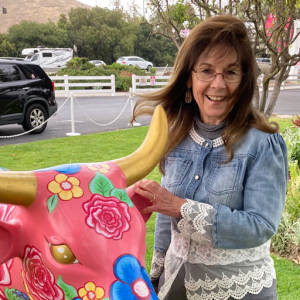2022 Wednesday — Daughter & Dad
Some of you who have been friends with me here on Blipfoto know that for the past 5 years the relationship with our daughter has been strained and mostly non-existent. In 2012 she left her husband of 23 years and her two young adult children. She was not making good decisions (that is my opinion, not hers). After several years of having her own little place, she moved in with the two of us into our large two-story home. Many weekends we were gone to the Central Coast and from mid-December to mid-February and again all summer we would be at the coast. She lived with us from June 2015 till about October 2017 when she left mad.
She has recently had some serious health issues; in January she had a kidney removed that had a tumor in it. Thankfully no cancer was found outside of the kidney; all lymph nodes were clear. She is currently being treated with antibiotics thru a picc line in her arm for a serious infection in her spine. This past year she began reaching out to us through Internet communication. Then when her dad, Mr. Fun, was not doing well in early January after a minor surgery that caused temporary side-effects, she stopped by to give him some packaged drinks to sooth his throat pain. That started the rekindling of getting together with her for a meal once in awhile. When we got back to SoCal yesterday, we had dinner with her.
We are all enjoying being together again and had dinner with her this evening at a local restaurant. In this photo we have just ordered our meal and she wanted to read a story to us from history about four military chaplains who lost their lives at sea when their ship sank. The story is very touching.
Here's one version of the story (it's long, but very good):
"During the Second World War, a German U-boat torpedoed the American troop transport Dorchester off the coast of Greenland on February 3, 1943. Of the 904 on board, 675 American soldiers and merchant seamen lost their lives in one of the largest sea disasters of World War II.
It was a day remembered for the enormous loss of life. It is also a day for remembering the story of four who could have saved their own lives, but chose instead to give their place in a lifeboat to four others.
The four men who made that sacrifice were Army chaplains: a Catholic priest, a Jewish rabbi, and two Protestant ministers. Each man had volunteered for military service. George Fox, a Methodist minister, had been a combat soldier in World War I and still suffered from wounds he had received. Yet after the Japanese attack on Pearl Harbor he volunteered for active duty. Rabbi Alexander Goode and Dutch Reformed minister Clark Poling left behind wives and young children. John Washington, a Roman Catholic priest, had just left his widowed mother.
The 1920s and ‘30s were a high water mark for religious intolerance in the United States. Anti-Semitism was widespread. Relations between evangelical Protestants and traditional Catholics were hardly better. To promote national cohesion in the war effort, the American military promoted the idea that Americans shared a common “Judeo-Christian tradition.”
Nothing seemed to exemplify wartime Judeo-Christian harmony better than the chaplains’ response when the torpedo struck the Dorchester. The four men raced on deck and tried to calm the panicked solders. They distributed life jackets and encouraged men to jump overboard into lifeboats waiting in the frigid water. When they realized that many of the stowed lifejackets and gloves had been destroyed, or the men had lost or forgotten to carry them on deck, they handed their own to the young men, insisting that the reluctant men take them. Some of those soldiers survived. As the ship went down, the four chaplains linked arms and, in unison, recited the Lord’s Prayer.
“It was the finest thing I have seen or hope to see this side of heaven,” said John Ladd, a survivor who witnessed the chaplains’ selfless acts.
In 1947, the US Post Office issued a stamp showing the “Four Immortal Chaplains” linked arm in arm. Two foundations dedicated to fighting religious prejudice were established in their memory. Dozens of plaques and stained-glass windows, including one in the Pentagon’s interfaith chapel, depict their sacrifice. In dedicating one of those windows, then President Harry S. Truman quoted the biblical verse, “Greater love hath no man than this, that a man lay down his life for his friends.”
The Four Immortal Chaplains no doubt felt personal fear that day. Surely each would have preferred to survive to return home to their families and loved ones. But faced with the choice between a place in a life raft or saving the lives of others, they chose to give of themselves. And they did so without thought of one faith over another. They gave of themselves willingly to all because of their faith."
- - - - - - - - - - - - - - - - - - - - - - - - - - - - - -
Listening to and watching our daughter Deidre (dee-dra) read that story from one of her devotional Bibles was deeply meaningful.
Good night from SoCal,
Rosie (& Mr. Fun), aka Carol
and Chloe & Mitzi too!

Comments
Sign in or get an account to comment.


